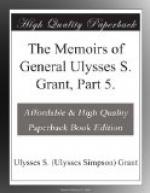During the 17th the fighting was very severe and the losses heavy; and at night our troops occupied about the same position they had occupied in the morning, except that they held a redan which had been captured by Potter during the day. During the night, however, Beauregard fell back to the line which had been already selected, and commenced fortifying it. Our troops advanced on the 18th to the line which he had abandoned, and found that the Confederate loss had been very severe, many of the enemy’s dead still remaining in the ditches and in front of them.
Colonel J. L. Chamberlain, of the 20th Maine, was wounded on the 18th. He was gallantly leading his brigade at the time, as he had been in the habit of doing in all the engagements in which he had previously been engaged. He had several times been recommended for a brigadier-generalcy for gallant and meritorious conduct. On this occasion, however, I promoted him on the spot, and forwarded a copy of my order to the War Department, asking that my act might be confirmed and Chamberlain’s name sent to the Senate for confirmation without any delay. This was done, and at last a gallant and meritorious officer received partial justice at the hands of his government, which he had served so faithfully and so well.
If General Hancock’s orders of the 15th had been communicated to him, that officer, with his usual promptness, would undoubtedly have been upon the ground around Petersburg as early as four o’clock in the afternoon of the 15th. The days were long and it would have given him considerable time before night. I do not think there is any doubt that Petersburg itself could have been carried without much loss; or, at least, if protected by inner detached works, that a line could have been established very much in rear of the one then occupied by the enemy. This would have given us control of both the Weldon and South Side railroads. This would also have saved an immense amount of hard fighting which had to be done from the 15th to the 18th, and would have given us greatly the advantage in the long siege which ensued.
I now ordered the troops to be put under cover and allowed some of the rest which they had so long needed. They remained quiet, except that there was more or less firing every day, until the 22d, when General Meade ordered an advance towards the Weldon Railroad. We were very anxious to get to that road, and even round to the South Side Railroad if possible.
Meade moved Hancock’s corps, now commanded by Birney, to the left, with a view to at least force the enemy to stay within the limits of his own line. General Wright, with the 6th corps, was ordered by a road farther south, to march directly for the Weldon road. The enemy passed in between these two corps and attacked vigorously, and with very serious results to the National troops, who were then withdrawn from their advanced position.
The Army of the Potomac was given the investment of Petersburg, while the Army of the James held Bermuda Hundred and all the ground we possessed north of the James River. The 9th corps, Burnside’s, was placed upon the right at Petersburg; the 5th, Warren’s, next; the 2d, Birney’s, next; then the 6th, Wright’s, broken off to the left and south. Thus began the siege of Petersburg.




